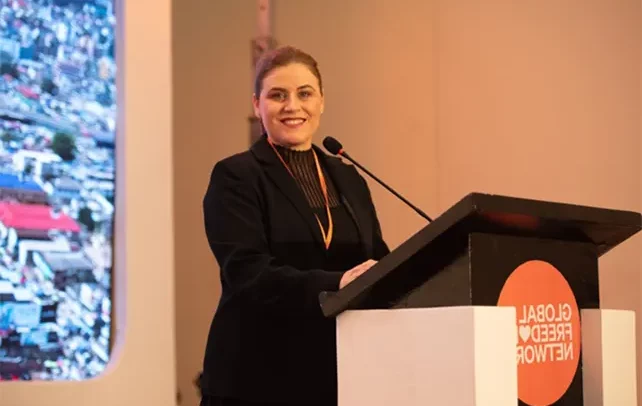Franca Pellegrini
The Head of the Global Freedom Network (GFN), Franca Pellegrini, has called for renewed global commitment to ending modern slavery, describing the challenge as “immense but surmountable through faith, unity, and action.”
Speaking at the GFN’s tenth anniversary gathering in Accra, Ms. Pellegrini expressed both gratitude for the network’s achievements and urgency about the ongoing fight. She recalled the GFN’s founding in December 2014, when twelve global religious leaders from Christianity, Islam, Hinduism, Judaism, and Buddhism signed a historic declaration at the Vatican to eradicate modern slavery within a generation.
“That moment was not just symbolic,” she said. “It signalled that slavery is a moral crisis — and that faith communities have a unique role in confronting it.”
Ms. Pellegrini explained that over the past decade, GFN has mobilised faith leaders worldwide, equipped communities to recognise and respond to slavery, and championed survivor-led initiatives that ensure lived experiences inform policy and action. The organisation has also fostered strong partnerships among faith communities, governments, and civil society to strengthen prevention and promote ethical practices.
She warned that despite these successes, modern slavery persists, with more than 50 million people worldwide trapped in various forms of exploitation, from forced labour to domestic servitude and child marriage, and asked stakeholders to take decisive steps towards ending this menace.
“Slavery continues to evolve adapting to conflict, climate change, migration, and inequality. Our response must match its scale and complexity.
“Ending modern slavery is the work of all of us together. Faith leaders, use your pulpits as platforms for freedom. Governments, let your policies uphold dignity. Civil society, continue to reach the marginalised. Survivors, your leadership is essential.”
“The road ahead is long, but our unity makes it possible. May our faith guide us, our unity give us strength, and our action bring freedom, dignity, and justice to all,” she said.
The founding executive director of the Sanneh Institute, Dr. John Azumah, drew links between slavery and religion, and admitted that there were many instances where religious leaders used scriptures to justify the act.
“Faith leaders in many different ways have been complicit in using very oppressive religious texts to justify slavery; religion was always corrupted to justify the practice,” he said.
He also urged the government to prioritise the passage of a bill aimed at addressing witchcraft accusations, highlighting that the recent change in parliament has hindered the progress of this important legislation, which was close to being approved.
“We have campaigned along with faith leaders in this room and other organisations for the last four years to really get the government to pass a bill against witchcraft accusations. We managed to get a bill passed in 2023 by Ghana’s parliament, but unfortunately, the bill was not signed into law. We’re praying that the current government will take responsibility and do something about this kind of danger to our vulnerable,” he added.
By Vera Owusu Sarpong


